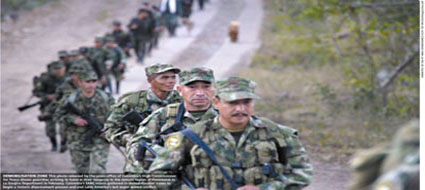TERRORIST RECRUITMENT
INEQUALITY AND INSURGENCY
Aaron Fernando discusses how underserved areas in countries become hotbeds for terrorist recruitment

Inequality has become a hot-button topic today – understandably so. The facts are so obscene that it’s difficult to believe they’re real. In January, Oxfam released a report revealing that the poorest half of the world’s population holds as much in assets as the eight wealthiest individuals. So in terms of quantifiable wealth and the Earth’s resources, eight people control as much as 3.6 billion people.
This fact may disturb some… but not the powerful.
Moral arguments do not seem to be sufficiently compelling to entice those in power to take meaningful action against systemic factors that drive inequality. So perhaps an argument concerning state security will do the job. It seems obvious that inequality is a driver of systemic instability that leads to increasing violence.
Such violence can take many forms – e.g. from organised crime and abuses in the informal sector to domestic violence. But upon flipping through the history books, it becomes obvious that there is a nexus between increasing inequality and rising poverty, as well as where insurgencies take root and remain entrenched for decades.
UNDERSERVED LOCALES Though it is often forgotten in public discourse, it is understood that insurgencies around the world usually provide social services as a political tactic to gain support from communities.
Among an array of documents from private researchers, firms and agencies, a 2009 interagency US government report lists ‘persuasion’ as an initial political strategy that’s used by insurgents to gain support.
It reports: “(With) the provision of money and basic social services, and the control of land or positions of authority… (insurgents) will exploit societal trends and popular grievances or needs, manipulating elements of religious, tribal, ethnic or local identity that resonate with some subset of the target population.”
This tactic provides funds, political power, information, and havens for violent movements and uprisings against the state.
From the standpoint of the insurgent, this argument is made explicit in the book Guerrilla Warfare, which has remained something of a handbook for guerrilla fighters around the world. Che Guevara explained why the guerrilla chooses to fight: “The guerrilla fighter is a social reformer… he takes up arms responding to the angry protest of the people against oppressors, and… he fights in order to change the social system that keeps all his unarmed brothers in ignominy and misery.”
It is precisely this argument that insurgents use around the world to gain support for their causes. Often, needs are greatest and popular grievances are worst in areas that are considered underserved – areas where governments either have restricted access to or have neglected the people for some reason or the other.
ECONOMIC GRIEVANCES From Hezbollah in Lebanon and FARC rebels in Colombia, to the Maoist insurgency in India and anti-oil industry rebels in the Niger Delta, the most obstinate and long-running uprisings share this quality: when a large region or population feels neglected, the vacuum for security, services or action can be and often is filled by militant groups.
There are economic underpinnings and lessons to be learned from these examples and others. For instance, the Naxalite-Maoist insurgency in India rails against the Indian state and corporations that systemically marginalise locals and communities by acquiring the rights to resources through coercion or collusion with the government.
In places like the Niger Delta, the industry is oil – purely extractive, which means that corporations leave little for residents of the area except pollution and environmental degradation. In almost every place with an intractable insurgency, the local community will harbour some sort of economic resentment and grievances against their government.
TERRORIST RECRUITS A recent study by the Institute for Defense Analyses (IDA) found that rising ‘bride prices’ – somewhat like the inverse of a dowry – acts as a regressive tax on single men. This transpires in West Africa and Pakistan where terrorist organisations like Boko Haram and Lashkar-e-Taiba have an easier time recruiting young men.
Reducing inequality within a country or region – or indeed, throughout the world – is a laudable goal but it’s also much more than that. The stakes are high – and it is not only our sense of morality that may be lost but our future as well. Without a more equitable distribution of wealth worldwide, there can never be peace or security.
Is it possible that half the world is lazy or imprudent and those eight men are simply that much smarter or business savvy?
Certainly not! The problem is systemic and so must be addressed systemically.
At the World Economic Forum in 2002, only a few months following the invasion of Afghanistan by the US in the aftermath of the 9/11 attacks, the then-Secretary of State Colin Powell remarked: “We can’t just stop with a single terrorist or a single terrorist organisation. We have to root out the whole system.”
He was speaking about poverty.
Today, a decade and a half later, it should come as no surprise that insurgencies are more obstinate than ever – not when eight men hold as much wealth as half of humanity.




